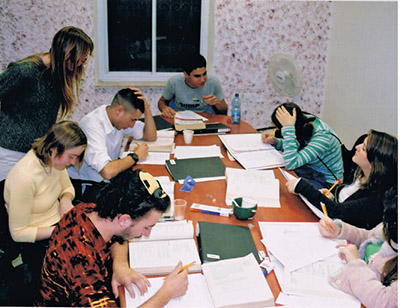

Just off the bustling junction of Jerusalem’s Zion Square lies a quiet street that leads to a door with an obscure sign reading “Crossroads.” To the average passerby, this is just another entrance to an apartment residence, but to a teenage immigrant from an English-speaking country, this may be the gateway to a better future.
Founded in 2001, Crossroads offers a range of prevention and intervention services and emotional and psychological support to English-speaking teens and young adults in Israel, including tourists who are spending a gap year in Israel and immigrants from English-speaking countries. Thanks to this organization, young Anglos have a place to turn to whether they are confused and are looking for a listening ear or they are in need of urgent help in order to cope with sexual or emotional abuse, drug addiction, anxiety, suicidal thoughts or a variety of other high-risk situations.
According to Director Robbie Sassoon, who made aliyah from Riverdale 10 years ago, without Crossroads, hundreds of Anglo teens and young adults would not be receiving the services and support they require. There is a variety of organizations and services that are available to at-risk youth, but only Crossroads caters specifically to young English speakers, providing support in an environment and culture that is comfortable to them. The staff of Crossroads speaks fluent English and consists mainly of immigrants to Israel who understand the complexities of adjusting to life in a foreign country.
Ben Druce, 33, an immigrant from West Orange who has called Jerusalem his home for the past 11 years, joined the Crossroads team four months ago as a social work intern. Druce is a student in The Wurzweiler School of Social Work Block Program at Yeshiva University.
“I always thought I would go into business. I studied economics and received my MBA. I was working for a software company for the past four years but I didn’t feel that what I was giving to the software industry is the kind of gift I had for the world. I didn’t think of social work right away but my first thought was to get away from the computer screen and be more with people,” shared Druce.
Crossroads certainly fits that description. During a typical evening in Crossroads’ Jerusalem drop-in center, over a dozen teens and young adults can be spotted engaging in a variety of activities, either playing a game of pool with Druce in the lounge, engaging in guitar lessons in the music room, studying with a volunteer for the GED or sitting in a closed room for a one-on-one session with a trained therapist. In addition to the Jerusalem center, Crossroads operates centers in Modiin, Bet Shemesh and Hashmonaim. The organization also runs a 24/7 hotline for youth in distress and is active on social media, addressing queries from youth who are looking for resources to those in crisis situations. During Thursday nights when downtown Jerusalem is notorious for its late-night parties, Crossroads’ staff members hit the streets, going to where the youth are to provide “street outreach.” All services are offered without a fee.
Druce is not surprised by the number of Anglo immigrants that seek Crossroads’ support. It is hard enough to deal with the challenges that come along with being a teenager, he explains. Combining that with a major life change such as moving to a different country, adjusting to a new language and trying to build new friendships takes a toll on many young immigrants. He emphasizes that it is not just teens and young adults who need support but immigrants in their 20s and 30s who would benefit from an organization that can offer a support system beyond social opportunities. “I don’t think people always appreciate the difficulties of making aliyah.”
“Crossroads goes into some of the dark corners of Israeli society,” sums up Druce. “I have only been doing this for a few months but I believe that you don’t have to be a social worker and on the frontlines to make a difference. It all matters, just with social work comes a feeling that, at least for me, I know I could not get from other work I was doing.”
Such moments are not infrequent in Crossroads. “We have a lot of stats but nothing is more real for me than what I see in front of me,” explains Sassoon. “Like the milestones, when somebody enlists in the army or gets married or lands a job. This is apparent on an everyday basis.”
“Before making aliyah I volunteered for an organization in Manhattan called Safe Space,” Sassoon continued. “We would go to the five boroughs finding these teens [with challenges]. When I began with Crossroads, I was thinking that here we are dealing with the same types of challenges but the difference is that here, these are my people. These are my family. It is meaningful to take care of my own.”
The approximately 1,000 teens and young adults that Crossroads serves each year can also look up to Druce, Sassoon and the other staff as their family. And whatever time of day it may be, they know that Crossroads is never too far out of reach.
By Alisa Bodner
Alisa Bodner is a native of Fair Lawn, and a Jerusalemite for the past seven years. She has been involved with numerous social initiatives to benefit underserved Israeli and Jewish populations and recently returned from volunteering with the Jewish community in Gondar, Ethiopia.










